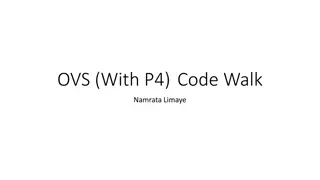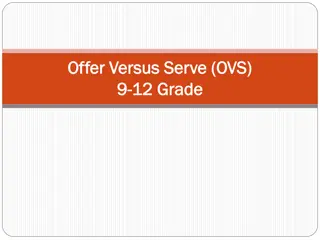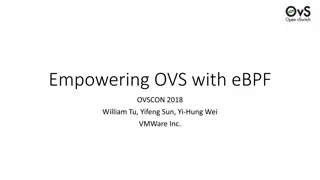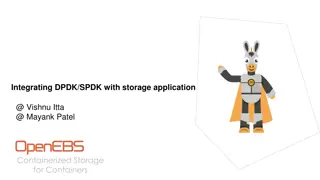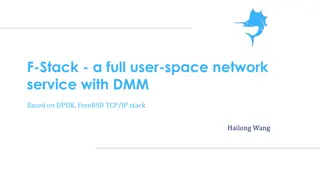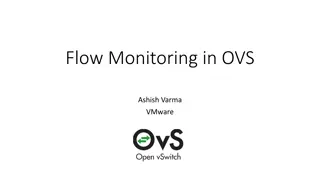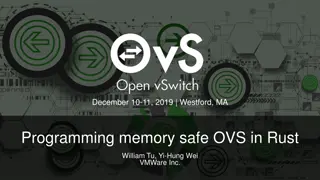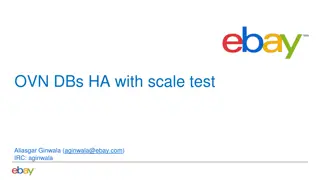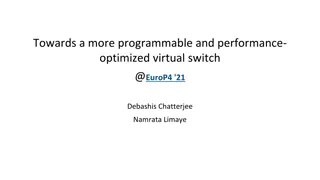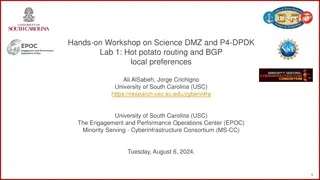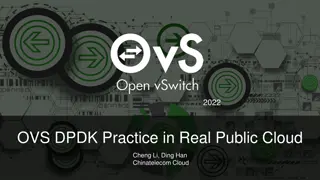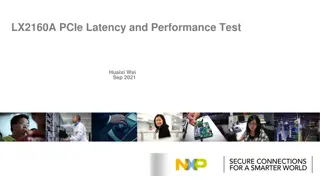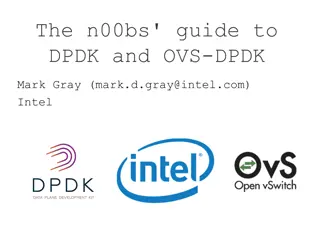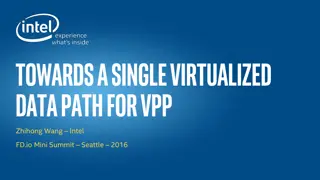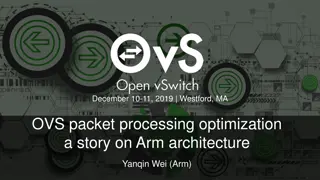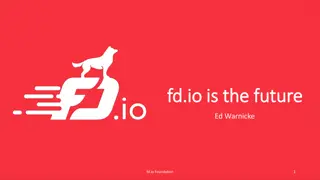Offer vs. Serve Training for School Food Authorities
Learn about Offer vs. Serve (OVS) meal service option for School Food Authorities, allowing children to decline some food items in reimbursable meals. Discover how OVS reduces food waste and costs with proper implementation. Training is essential for staff to assist children in selecting a reimbursa
1 views • 39 slides
Virtual Labs and Cybersecurity Overview at 2021 Winter ICT Educators Conference
Welcome to the 2021 Winter ICT Educators Conference featuring sessions on virtual labs on SDN, Open Virtual Switches (OVS), cybersecurity, and more by Jorge Crichigno from the University of South Carolina. The agenda includes discussions on motivation, NETLAB environment, software-defined networking
7 views • 36 slides
Understanding Offer Versus Serve (OVS) Training for School Food Authorities
Offer Versus Serve (OVS) is a meal service option available for approved School Food Authorities (SFAs) in the Summer Food Service Program (SFSP). OVS allows children to decline certain meal components, reducing food waste and costs when properly implemented. However, it is crucial to adhere to meal
0 views • 41 slides
OVS with P4 Code Walk Overview
OVS with P4 Code Walk by Namrata Limaye integrates P4, P4runtime, Openconfig, and more to enhance control plane elements. The design and future implementations focus on P4-DPDK, Tofino backend support, and enhanced kernel control plane functionalities. The project also offers detailed container setu
0 views • 6 slides
Understanding Offer Versus Serve (OVS) in High School Meals
Offer Versus Serve (OVS) is a system required for high school meals, specifically for grades 9-12. It ensures that a reimbursable meal offers a variety of components, such as meat/meat alternate, grains, vegetables, fruits, and milk. Students have the option to decline certain components while meeti
0 views • 25 slides
Leveraging eBPF for Enhanced Open vSwitch Functionality
Explore how eBPF technology empowers Open vSwitch (OVS) to implement datapath functionalities, reduce kernel version dependencies, and facilitate experimentation. Discover the benefits of eBPF, supported features, and project updates within OVS, enhancing flow processing efficiency and supporting a
0 views • 31 slides
Integrating DPDK/SPDK with Storage Applications for Improved Performance
This presentation discusses the challenges faced by legacy storage applications and proposes solutions through the integration of DPDK/SPDK libraries. Topics covered include the current state of legacy applications, issues such as heavy system calls and memory allocations, possible solutions like lo
2 views • 17 slides
Optimizing User-Space Network Services with F-Stack and FreeBSD TCP/IP Stack
F-Stack, a user-space network service using DPDK and FreeBSD TCP/IP stack, addresses challenges in handling service traffic like CDN and live streaming. By leveraging 25GbE, 40GbE, and 100GbE NICs, coupled with multi-core CPUs and kernel bypass techniques, F-Stack overcomes bottlenecks between user
1 views • 17 slides
Understanding Flow Monitoring in OVS for Efficient Network Management
Learn how Flow Monitoring in Open vSwitch (OVS) allows controllers to track and manage changes to flow tables, enabling efficient network management. Explore topics such as Flow Mod programming, Flow Monitor messages, OVS support, monitoring vs. snoop, and practical examples of flow monitoring in ac
0 views • 9 slides
Programming memory safe OVS in Rust
Explore the benefits of Rust programming language in providing memory safety while eliminating common memory issues like uninitialized variables, dangling pointers, and memory leakages. Rust's ownership model and borrowing system allow for secure memory management, ensuring high performance and elim
0 views • 18 slides
Optimizing Incremental Processing in OVN-Controller for Enhanced Efficiency
Explore the challenges faced in scaling OVN-Controller, the benefits and issues of recomputing OVS flows, and the implementation of an Incremental Processing Engine to efficiently handle dependencies. Dive into the Dependency Graph of OVN-Controller to understand the various components involved in t
1 views • 16 slides
Understanding OVN Scale Testing for Improved Performance
Explore the significance of scale testing for OVN components, including OVN-Controller, OVS-vSwitchd, and OVN-Northd, to enhance performance and identify bugs early on. Learn about the purpose, benefits, and tools like OVN Scale Test and Rally OVS for conducting scalability tests effectively in clou
0 views • 25 slides
Towards a More Programmable and Performance-Optimized Virtual Switch @ EuroP4 '21
This presentation discusses the development of a more programmable and performance-optimized virtual switch at EuroP4 '21. It covers topics such as P4 with OVS, challenges in OVS hardware offload, P4 enhanced Open vSwitch, P4 components in OVS, stacked pipelines, and various control and data planes
0 views • 10 slides
Hands-On Workshop on Science DMZ and P4-DPDK Lab
Join the workshop at the University of South Carolina to learn about hot potato routing, BGP local preferences, and hands-on lab activities focusing on network topologies and configurations. Explore the Lab Topology, Lab Configuration, and Platform Information for an interactive learning experience
0 views • 6 slides
OVS DPDK Practice in Real Public Cloud: Solutions for Performance Optimization
Explore innovative solutions for optimizing Open vSwitch with Data Plane Development Kit (OVS DPDK) performance in real public cloud environments. Insights include meter lock scenario resolution, conntrack performance improvement, and flow-based connection tracking limitation enhancements. These sol
0 views • 8 slides
PCIe Latency and Performance Test on LX2160A
This document discusses PCIe latency and performance testing using Lmbench and DPDK qdma_demo on LX2160A hardware. It covers test configurations, latency measurements, throughput analysis, and peer-to-peer communication details.
0 views • 12 slides
Beginner's Guide to DPDK and OVS-DPDK
This presentation by Mark Gray provides a beginner-friendly introduction to DPDK and OVS-DPDK, targeted at those who are new to these technologies. It covers important disclaimers, methodology, software versions, and practical steps such as cloning the DPDK repository, checking out specific versions
0 views • 88 slides
Evolution of DPDK Vhost for VPP: Enhancing Performance and Functionality
DPDK Vhost for VPP is undergoing continuous evolution to enhance performance and functionality with features such as reconnect, live migration, offloading, and more. The integration between VPP and Vhost PMD is improving, leading to better network platform capabilities. The development efforts aim t
0 views • 10 slides
Optimizing Packet Processing on Arm Architecture in OVS: A Story of Performance Enhancement and Stability
Exploring the optimization of packet processing on Arm architecture in OVS, focusing on improving performance and stability through various techniques such as offloading datapath operations, implementing efficient lookup tables, accelerating hash calculations, and addressing bottlenecks. The agenda
0 views • 22 slides
OVS DPDK Community Update - December 5th-6th, 2018 in San Jose, CA
Update on OVS DPDK feature history and development branches including added userspace features, DPDK support, vhostcuse support, multi-queue support, and various other enhancements from versions 2.0 to 2.10. The update covers significant changes such as n_rxq for PMD interfaces, pmd-rxq-affinity, Qo
0 views • 13 slides
The Future of Fast Data Processing with fd.io VPP
Explore the future of fast data processing through the innovative fd.io VPP technology. VPP stands as a high-performance packet processing platform running on commodity CPUs. It leverages DPDK for optimal data plane management and boasts fully programmable features like IPv4/IPv6 support, MPLS-GRE,
0 views • 15 slides



